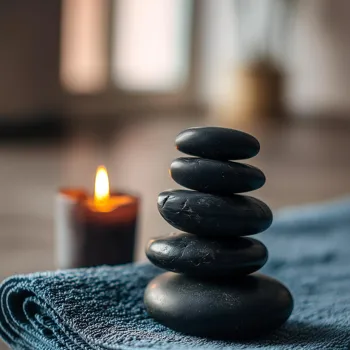Discover 8 simple ways to reduce stress in your daily life. From mindful mornings to digital detox, prioritize your well-being
In today's fast-paced world, stress has become a common companion. From managing
work deadlines to navigating personal responsibilities, the pressures of daily life can quickly pile up. But don't worry, there are many small things you can incorporate into your daily routine to keep stress at bay.

These aren't complicated, involve no big changes, and are easy to follow, for anyone, irrespective of age and background. Here are eight practical ways to reduce stress and bring more peace into your everyday life.
Mindful Mornings for a Calm Day: Start your day with intention. Instead of immediately reaching for your phone, dedicate the first few minutes to mindful activities. This could be as simple as sitting quietly with a cup of tea, focusing on the warmth and aroma, or taking a few deep breaths, paying attention to the rise and fall of your chest. Even a short period of meditation can make a big difference, you can find many apps that guide you through simple meditation techniques. When you do this, you set a calm, positive tone for the day. A chaotic morning can leave you running behind and stressed before you even reach your workplace, leading to further build up of stress as the day progresses
The benefits of starting the day this way are many, it helps you wake up properly, allowing your system to prepare you for the day properly. Without that initial calm the system might feel overwhelmed straight away and cortisol levels will be high, impacting your decision, work and so on.

A stressful morning will have a negative impact on you and all around you. A good start of the day allows yourself to better plan for the day and prioritize what is important. You can tackle the issues one by one instead of being overwhelmed and tackle all the issues at one go.
Incorporating mindfulness into your morning routine doesn’t require a significant time commitment. Even just five to ten minutes can be enough to center yourself and prepare for the day ahead.
As you practice mindful mornings, you'll notice a shift in your overall stress levels and a greater sense of calm throughout the day. This little things add ups and makes a big difference. The feeling of being in control of the day goes a long way towards lowering your overall stress levels.
Before you know it, your outlook on the day will drastically improve. This will benefit everything you do, from the smallest to the greatest tasks.
Embrace the Power of Breaks: Taking regular breaks throughout the day is crucial for managing stress. When you're engrossed in work, it's easy to lose track of time and push yourself to keep going. However, this can lead to burnout and increased stress levels. Stepping away from your work for a few minutes every hour can rejuvenate your mind and body. Try giving your eyes a rest by looking away from the screen every twenty minutes, for twenty seconds. This simple technique, known as the 20-20-20 rule, helps to reduce eye strain and mental fatigue.
When you find yourself stuck on a problem, instead of endlessly trying to solve it, often the best thing to do is to take a break. Step away from the situation, doing something relaxing that will take your mind off the task at hand can help to promote creative solutions.

Your system needs to rest and reset to process information properly which is important when you are faced with challenges that require you to think deeply. Trying to solve problems without rests will only make things worse as the brain will be tired and will be working sub-optimally.
Breaks doesn't need to be long or complicated. Get up from your desk and stretch, walk around the office, or simply close your eyes and take a few deep breaths. You can listen to music, or a short guided meditation.
Sometimes, just talking to a colleague or friend it all that is needed to shake off stress. Don’t think of breaks as a distraction from work; view them as an investment in your overall well-being and productivity.
Taking regular breaks helps to reduce stress and ultimately improve your overall performance.
Move Your Body, Calm Your Mind: Physical activity is a powerful stress reliever. You might be thinking, "Who has time for exercise?" But it doesn't have to be a strenuous workout at the gym. Even a short walk or stretching session can work wonders. Exercise releases endorphins, which have mood-boosting effects. A brisk walk in the park, a bike ride, or even dancing to music can help clear your mind and reduce tension.
Exercise also helps to improve the quality of sleep, which is essential for stress management. When you're stressed, you might find it difficult to fall asleep or stay asleep. Regular exercise can help regulate your sleep cycle and promote restful sleep.
Even a small walk in you neighborhood or building can make a big difference. Exercise doesn't have to be painful, it needs to be something you enjoy and look forward to. When you find an activity you like, you're more likely to stick with it.
Finding time for physical activity even when you're busy can be challenging. Incorporate exercise into your daily routine gradually. Take the stairs instead of the elevator, walk or bike to work if possible, or schedule short exercise breaks throughout the day.
The key is to find activities that you enjoy and that fit into your lifestyle. Whether it's walking, yoga, swimming, or dancing, finding a way to move your body will help reduce stress and improve your overall well-being.
Connect and Communicate: Maintaining strong social connections is essential for managing stress. Talking to friends, family, or colleagues can provide emotional support and help you feel less alone. Sharing your thoughts and feelings with others can help you gain a new perspective on your problems and find solutions. It also can help you feel that you are not alone in your problems and know that you have people that care about you.
Make time for social activities, even if it's just a quick phone call or a virtual coffee break. Reaching out to loved ones can significantly reduce feelings of isolation and stress. Joining a club or group with common interests can provide opportunities to meet new people and build connections.
Sometimes it also makes you feel connected to a community, whether it is based on profession, common interests and hobbies. Finding comfort and being able to relate to others go a long way in resolving mental stress.
If you're feeling overwhelmed, don't hesitate to seek professional help.
Talking to a therapist or counselor can provide you with tools and strategies to manage stress effectively. Sometimes talking to a neutral and unbiased professional provides a fresh perspective to understand the problem in hand.
Opening up to others and seeking support when needed is a sign of strength, not weakness.
Digital Detox: In today's digital age, it's easy to get caught up in the constant stream of notifications and information. Spending too much time on social media can increase stress and anxiety. Take regular digital detoxes to disconnect from technology and reconnect with yourself and your surroundings. Turn off notifications, put away your phone, and engage in activities that don't involve screens.
Using your phones and social media also take a toll on you, not only through the news, and events and people around us, but also from the radiation emitted from the electronic devices. It is good to avoid prolonged use and ensure that you take breaks to avoid any side effects.
Also, people often get into an addictive cycle whereby they need to constantly check and receive and this also contribute to feeling like they constantly overwhelmed. It also stops yourself from enjoying the moments that you are having as you try to share the moments with the world.
Enjoy a walk in nature, read a book, spend time with loved ones, or engage in a hobby. Doing this will allow your mind and body to rest and recharge. Regularly scheduling digital detoxes can significantly reduce stress and improve your overall well-being.
You can set aside one day a week, or simply a few hours each day, to disconnect and focus on non-digital activities. This will make a big difference to reduce stress.
Prioritize Tasks and Learn to Say No: Feeling overwhelmed often stems from trying to do too much at once. Learning to prioritize tasks and manage your time effectively can significantly reduce stress. Make a to-do list and focus on the most important tasks first. Break down large tasks into smaller, manageable steps. This allows you to feel less burdened by everything that you need to do. You are then able to systematically complete your tasks as well.
It's also important to learn to say no to additional commitments when you're already feeling stressed. Overcommitting yourself can lead to burnout and increased anxiety. Politely decline requests that don't align with your priorities or that you simply don't have time for.
Understand that you are capable of doing so much in the day, and not everything comes first in the list! It is also important to take into account factors such as the timelines, cost and so on.
Effective time management and setting boundaries are essential skills for stress reduction.
By prioritizing tasks and learning to say no, you can create more space in your life for relaxation and self-care. Saying no is empowering and helps you reclaim control over your time and energy. This helps promote both mental and physical health in the long run.
Cultivate Gratitude: Practicing gratitude can have a profound impact on your stress levels. Taking time to appreciate the good things in your life, no matter how small, can shift your perspective and reduce negative emotions. Keep a gratitude journal and write down things you're grateful for each day. This could include anything from a beautiful sunrise to a supportive friend.
Expressing gratitude to others can also boost your mood and strengthen your relationships. Taking that shift can also open your eyes to new benefits and learnings, that you would have missed out on, had you been focused on being stressed.

You will be happier as you look at the positives and be more willing to engage with the world. When you are open to new experiences you allow for growth to happen as well.
Focusing on the positive aspects of your life can help you cope with stress and adversity.
Gratitude is a powerful tool for improving your overall well-being and reducing stress. Making it a part of your daily routine can have a lasting impact on your mental and emotional health. This will keep you focused and motivated on building on that gratitude.
Sleep Soundly: Getting enough sleep is crucial for managing stress. When you're sleep-deprived you will have low energy and are also more prone to stress, you're more likely to feel irritable, anxious, and overwhelmed. Establish a regular sleep schedule and create a relaxing bedtime routine to promote restful sleep. As they say a fresh start starts with a great rest!
Create a calming environment in your bedroom by making sure it's dark, quiet, and cool. Avoid caffeine and alcohol before bed, and try to avoid screens for at least an hour before sleeping. These disrupt your sleep cycle and make it harder to fall asleep.

Do not drink heavy fluids before you sleep as it is bound to disrupt the sleep during the night. Sometimes you can invest in aromatherapy or other relaxation tools for better sleep.
Prioritizing sleep is an investment in your overall well-being.
Getting enough sleep and a good night's rest and reduce stress and improve your mood, focus, and productivity. Making sleep a priority will help you manage stress more effectively and enjoy a happier, healthier life.
AI Generated Content. Glance/InMobi shall have no liability for the content


















